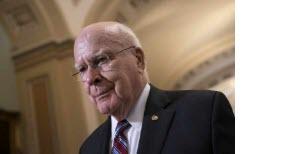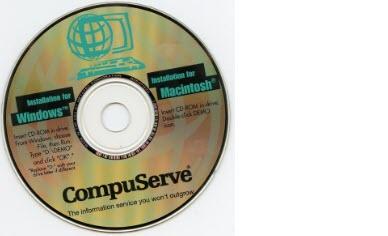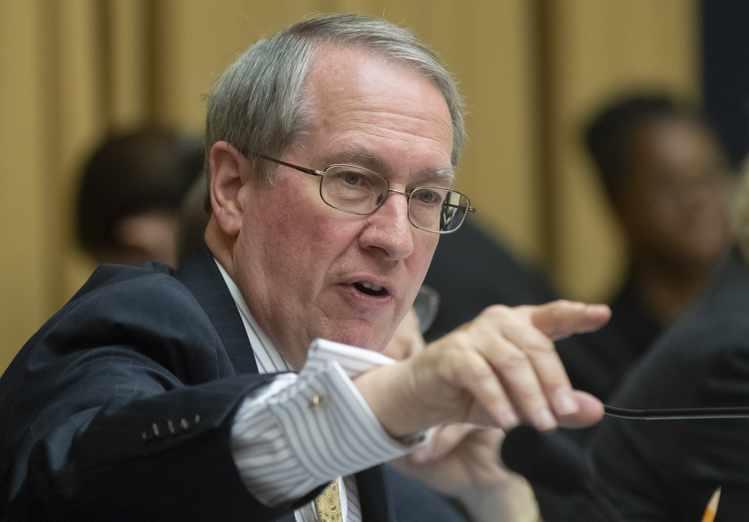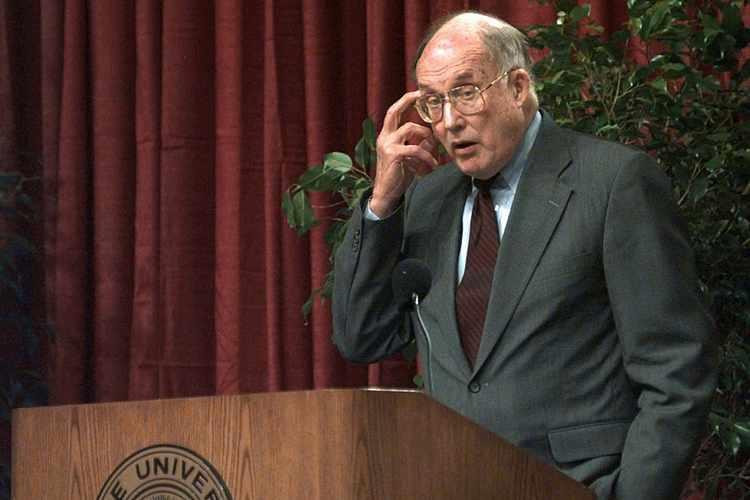Policing The Internet: A Bad Idea In 1996... And Today
Authored by Chris Cox via RealClearPolitics.com,
A new wave of regulatory fervor is rippling through Congress as representatives and senators alike search for ways to control online content they find offensive. It is all reminiscent of the debate that took place at the birth of the Internet a quarter-century ago, when the same issues of content moderation, privacy, free speech, and the dark side of cyberspace first surfaced.

At that time, James Exon, a little-known senator from Nebraska, advanced a proposal for federal regulation of every user of the Internet -- and almost everyone else involved in its architecture and delivery. Dubbed the Communications Decency Act, his legislation would have placed the federal government in the role of speech police, threatening every user of the Internet and Internet service providers alike with fines and prison for posting content that was constitutionally protected. This misguided approach likely would have prevented today’s seemingly infinite variety of user-generated content from ever developing in the first place.
Exon’s bad idea briefly became law in 1996, but thankfully never took effect because the federal courts, and eventually the U.S. Supreme Court, declared it unconstitutional. That should have been the end of the story.
Amid today’s resurgence of support for government regulation of online content, however, the neo-regulators are resurrecting Sen. Exon’s memory, or at least their revisionist version of it. They want to repeal existing federal law known colloquially as “Section 230” that places responsibility on users who post illegal content, and instead shift the blame to the website or social media platform on which it is posted. And they’re invoking Exon’s unconstitutional attempt to restrain free speech on the Internet in support of the effort.
Exon’s Communications Decency Act and Section 230 became law at the same time, even though Section 230 was originally designed as a reproach of Exon. It declared federal regulation of online speech off limits and gave Internet platforms immunity from liability for their own efforts to moderate content. When these two opposite approaches were both included as amendments to a larger bill in a typical Washington backroom political deal, many observers scratched their heads and wondered what Congress was thinking.
But the claim now being made is that the two were actually like legislative epoxy, with one part requiring the other. Since Exon was tossed out, so the argument goes, Section 230 should not be allowed to stand on its own.
In fact, the revisionists contend, the primary congressional purpose back in 1996 was not to give Internet platforms immunity from liability as Section 230 does. Rather, the most important part of their imagined “package” was Exon’s radical idea of imposing stringent liability on websites for the illegal acts of others -- an idea that Exon himself backed away from before his amendment was actually passed. Now, a quarter-century after the Supreme Court threw out the Exon bathwater, the neo-speech regulators are urging us to throw out the Section 230 baby along with it.
The reality is far different than this revisionist history would have it. As the original sponsor of Section 230, I know. I was there.
Playing the Porn Card
It was a hot, humid Washington day in the summer of 1996 when the Democratic senator from Nebraska, standing at his desk on the Senate floor, read the following prayer into the record as a prelude to introducing his landmark legislation that would be the first ever to regulate content on the Internet:
Almighty God, Lord of all life, we praise You for the advancements in computerized communications that we enjoy in our time. Sadly, however, there are those who are littering this information superhighway with obscene, indecent, and destructive pornography. ... Lord, we are profoundly concerned about the impact of this on our children. ... Oh God, help us care for our children. Give us wisdom to create regulations that will protect the innocent.

Sen. James Exon, whose bill banned anything unsuitable for minors from the Internet. United States Senate Historical Office/Public Domain
Immediately following his prayer, Sen. Exon found it had been answered, in the form of his own proposal to ban anything unsuitable for minors from the Internet. His bill instructed the Federal Communications Commission to adopt and enforce regulations that would limit what adults could access online, and could themselves say or write, to material that is suitable for children. Anyone who posted any “indecent” communication, including any “comment, request, suggestion, proposal, [or] image” that was viewable by “any person under 18 years of age,” would become criminally liable, facing both jail and fines.
The Exon dragnet was cast wide: Not only would the content creator -- the person who posted the article or image that was unsuitable for minors -- face jail and fines, the intent was to make “online services” and even “access software providers” liable as well. Meanwhile, Internet service providers would be exempted from civil or criminal liability for the limited purpose of eavesdropping on customer email in order to prevent the transmission of potentially offensive material.
Like his Nebraska forebear William Jennings Bryan, who passionately defended creationism at the infamous Scopes “Monkey Trial,” James Exon was not known for being on the cutting edge of science and technology. His motivation to protect children from harmful pornography was pure. But his grasp of the rapidly evolving Internet was sorely deficient. He was not alone: A study completed that same week revealed that of senators who voted for his legislation, 52% had no Internet connection.
Unfamiliarity with the new technology they were attempting to regulate had immediate side effects. What many of these senators failed to grasp was how different the Internet was from the communications technologies with which they were familiar and had regulated through the Federal Communications Commission for decades.
Broadcast television had long consisted of three networks; and even with the advent of cable, the content sources were relatively few and all the millions of viewers were passive. Radio, likewise. For years there had been one phone company and now there were but a handful more. The locus of all of this activity was domestic, within the jurisdiction and control of the United States.
None of this bore any relation to the Internet.
On this new medium, the number of content creators -- each a “broadcaster,” as it were -- was the same as the number of users. It would soon expand from hundreds of millions to billions. It would be an impossibility for the federal government to pre-screen all the content that so many people were creating all day, every day. And there was the fact that the moniker “World Wide Web” was entirely apt, since the Internet functions globally. It was clear to many, even then, that most of the content creation would ultimately occur outside the jurisdiction of federal authorities -- and that enforcement of Exon-like restrictions in the U.S. would simply push the sources of the banned content offshore.
Above all, the Internet was unique in that communications were instantaneous: The content creators could interact with the entire planet without any intermediation or lag time. In order for censors to intervene, they would have to destroy the real-time feature of the technology that made it so useful.
Not everyone in the Senate was wild about the Exon bill. The chairman of the Senate Commerce Committee, Larry Pressler, a South Dakota Republican, tried to table it in his committee. Vermont Democrat Patrick Leahy, the ranking Democrat on the Judiciary Committee’s antitrust, business rights and competition subcommittee, opposed it for a prescient reason: the law of unintended consequences. “What I worry about, is not to protect pornographers,” Leahy said. “Child pornographers, in my mind, ought to be in prison. The longer the better. I am trying to protect the Internet, and make sure that when we finally have something that really works in this country, that we do not step in and screw it up, as sometimes happens with government regulation.”
But Exon was persistent in pursuing what he called the most important legislation of his career. He went so far as to lobby his colleagues on the Senate floor by showing them the hundreds of lewd pictures he had collected in his “blue book,” all downloaded from the web and printed out in color. It made “Playboy and Hustler look like Sunday-school stuff,'' he warned them. The very day he offered his prayer, the Senate debated whether to add Exon’s legislation to a much larger bill pending in Congress. This was the first significant overhaul of telecommunications law in more than 60 years, a thorough-going revision of the Communications Act of 1934. Though that overhaul was loaded with significance, the pornography debate -- broadcast live on C-SPAN, then still a novelty -- is what caught the public’s attention.

Sen. Patrick Leahy in recent times. More than two decades ago, he worried that Exon's bill would "screw up" the Internet. Scott Applewhite
During that brief debate, breathless speeches conjuring lurid images of sordid sex acts overwhelmed academic points about free speech, citizens’ privacy rights, and the way the Internet’s packet-switched architecture (which routes data without pre-established paths) actually works. The threat posed to the Internet itself by Exon’s vision of a federal speech police paled into irrelevance.
With millions of people watching, senators were wary of appearing as if they did not support protecting children from pornography. The lopsided final tally on Exon’s amendment to the Telecommunications Act showed it. The votes were 84 in favor, 16 opposed.
The House to the Rescue
When it came to familiarity with the Internet, the House of Representatives was only marginally more technologically conversant than the Senate. While a handful of members were savvy about “high tech,” as it was called, most were outright technophobes quite comfortable with the old ways of doing things. Nothing wrong with paper files in folders, postcards and letters on stationery, and the occasional phone call. The Library of Congress was filled with books, so no need for any additional sources of information. Many of the committee chairs, given the informal seniority system in the House, were men in their 70s.
On the day Exon’s bill passed the upper chamber, more than half of the senators didn’t even have an email address. In the House it was worse: Only 26% of members had an email address. The conventional wisdom was that, with the World’s Greatest Deliberative Body having spoken so definitively, the House would follow suit. And for the same reason: With every House member’s election just around the corner, none would want to appear weak on pornography. The near-unanimous Senate vote seemed dispositive of the question.
While it is often the case that the House legislates impulsively while the Senate takes its time, in this case the reverse happened. As chairman of the House Republican Policy Committee -- and someone who built his own computers and had been using the Internet for years -- I took a serious interest in the issue. After some study of Exon’s legislation, I had already decided to write my own bill, as an alternative. Fortuitously, I was a member of the Energy and Commerce Committee, which on the House side had jurisdiction over the Telecommunications Act to which Exon had attached his bad idea.
One of the tech mavens in the House at the time was Ron Wyden, a liberal Democrat from Oregon whose Stanford education and activist streak (he’d run the Gray Panthers advocacy group in his home state during the 1970s) made him a terrific legislative partner. The two of us had recently shared a private lunch and bemoaned the deep partisanship in Congress that mostly prevented Democrats and Republicans from writing legislation together. We decided this was due to members flogging the same old political hot-button questions, on which everyone had already made up their minds.
At the conclusion of our lunch, we decided to look for cutting-edge issues that would present novel and challenging policy questions, to which neither we nor our colleagues would have a knee-jerk response. Then, after working together to address the particular issue with a practical solution, we’d work to educate members on both sides, and work for passage of truly bipartisan legislation. It was not much longer afterward that the question of regulating speech on the Internet presented itself, and Ron and I set to work.

In 1996, then-Rep. Ron Wyden teamed with the author to incentivize technologies allowing parents to become the censors in their own households. (AP Photo/Andrew Harnik, Pool)
Shortly thereafter, Time magazine reported that “the balance between protecting speech and curbing pornography seemed to be tipping back toward the libertarians.” It noted that “two U.S. Representatives, Republican Christopher Cox of California and Democrat Ron Wyden of Oregon, were putting together an anti-Exon amendment that would bar federal regulation of the Internet and help parents find ways to block material they found objectionable.”
We named our bill the Internet Freedom and Family Empowerment Act, to describe its two main components: protecting speech and privacy on the Internet from government regulation, and incentivizing blocking and filtering technologies that individuals could use to become their own censors in their own households. Pornographers illegally targeting minors would not be let off the hook: They would be liable for compliance with all laws, both civil and criminal, in connection with any content they created.
To avoid interfering with the essential functioning of the Internet, the law would not shift that responsibility to Internet platforms, for whom the burden of screening billions of digital messages, documents, images, and sounds would be unreasonable -- not to mention a potential invasion of privacy. Instead, Internet platforms would be allowed to act as “Good Samaritans” by reviewing at least some of the content if they chose to do so in the course of enforcing rules against “obscene, lewd, lascivious, filthy, excessively violent, harassing, or otherwise objectionable” content.
This last feature of the bill resolved a conflict that then existed in the courts. In New York, a judge had held that one of the then-two leading Internet platforms, Prodigy, was liable for defamation because an anonymous user of its site had claimed that an investment bank and its founder, Jordan Belfort, had committed securities fraud. (The post was not defamatory: Belfort was later convicted of securities fraud, but not before Prodigy had settled the case for a substantial figure. Belfort would achieve further infamy when he became the model for Leonardo DiCaprio’s character in “The Wolf of Wall Street.”)
In holding Prodigy responsible for content it didn’t create, the court effectively overruled a prior New York decision involving the other major U.S. Internet platform at the time, CompuServe. The previous case held that online service providers would not be held liable as publishers. In distinguishing Prodigy from the prior precedent, the court cited the fact that Prodigy, unlike CompuServe, had adopted content guidelines. These requested that users refrain from posts that are “insulting” or that “harass other members” or “are deemed to be in bad taste or grossly repugnant to community standards.” The court further noted that these guidelines expressly stated that although “Prodigy is committed to open debate and discussion on the bulletin boards ... this doesn't mean that ‘anything goes.’”

In the early Internet era, CompuServe chose not to adopt content guidelines, in contrast to its chief competitor, Prodigy. Flickr
CompuServe, in contrast, made no such effort. On its platform, the rule was indeed “anything goes.” As a user of both services, I well understood the difference. I appreciated the fact that there was some minimal level of moderation on the Prodigy site. While CompuServe was a splendid service and serious users predominated, the lack of any controls whatsoever was occasionally noticeable and, I could easily envision, bound to get worse.
If allowed to stand, this jurisprudence would have created a powerful and perverse incentive for platforms to abandon any attempt to maintain civility on their sites. And a legal standard that protected only websites where “anything goes” from unlimited liability for user-generated content would have been a body blow to the Internet itself. Ron and I were determined that good faith content moderation should not be punished, and so the Good Samaritan provision in the Internet Freedom and Family Empowerment Act was born.
In the House leadership, of which I was then a member, there were plenty of supporters of our effort. The new speaker, Newt Gingrich, had long considered himself a tech aficionado and had already proven as much by launching the THOMAS project at the Library of Congress to digitize congressional records and make them available to the public online. He slammed the Exon approach as misguided and dangerous.
“It is clearly a violation of free speech, and it's a violation of the right of adults to communicate with each other,” Gingrich said at the time, adding that Exon’s proposal would dumb down the Internet to what censors believed was acceptable for children to read. “I don't think it is a serious way to discuss a serious issue,” he explained, “which is, how do you maintain the right of free speech for adults while also protecting children in a medium which is available to both?”
Dick Armey, then the new House majority leader, joined the speaker in supporting the Cox-Wyden alternative to Exon. So did California’s David Dreier, another Republican, who was closely in touch with the global high-tech renaissance being led by innovators in his home state. They were both Republicans, but my fellow Californian Nancy Pelosi, not yet a member of the Democratic leadership, weighed in as well, noting that Exon’s approach would have a chilling effect on serious discussion of HIV-related issues.
In the weeks and months that followed, Ron and I conducted outreach and education among our colleagues in both the House and Senate on the challenging issues involved. It was a rewarding and illuminating process, during which we built not only overwhelming support, but also a much deeper understanding of the unique aspects of the Internet that require clear legal rules for it to function.
Two months after Sen. Exon successfully added his Communications Decency Act to the Telecommunications Act in the Senate, the Cox-Wyden measure had its day in the sun on the House floor. Whereas Exon had begun with a prayer, Ron and I began on a wing and prayer, trying to counter the seemingly unstoppable momentum of a near-unanimous Senate vote. But on this day in August, the debate was very different than it had been across the Rotunda.
Speaker after speaker rose in support of the Cox-Wyden measure, and condemned the Exon approach. Rep. Zoe Lofgren (D-Calif.), the mother of 10- and 13-year-old children, shared her concerns with Internet pornography and noted that she had sponsored legislation mandating a life sentence for the creators of child pornography. But, she emphasized, “Senator Exon's approach is not the right way. … It will not work.” It was, she said, “a misunderstanding of the technology.”

Rep. Bob Goodlatte joined the chorus of those warning about the threat posed by Exon-style regulation of the Internet. AP Photo/J. Scott Applewhite
Rep. Bob Goodlatte, a Virginia Republican, emphasized the potential the Internet offered and the threat to that potential from Exon-style regulation. “We have the opportunity for every household in America, every family in America, soon to be able to have access to places like the Library of Congress, to have access to other major libraries of the world, universities, major publishers of information, news sources. There is no way,” he said, “that any of those entities, like Prodigy, can take the responsibility to edit out information that is going to be coming in to them from all manner of sources.”
In the end, not a single representative spoke against the bill. The final roll call on the Cox-Wyden amendment was 420 yeas to 4 nays. It was a resounding rebuke to the Exon approach in his Communications Decency Act. The House then proceeded to pass its version of the Telecommunications Act -- with the Cox-Wyden amendment, and without Exon.
Rise and Fall
The Telecommunications Act, including the Cox-Wyden amendment, would not be enacted until the following year. In between came a grueling House-Senate conference that was understandably more concerned with resolving the monumental issues in this landmark modernization of FDR-era telecommunications regulation. During the extended interlude, Ron and I, along with our now much-enlarged army of bipartisan, bicameral supporters, continued to reach out in discussions with members about the novel issues involved and how best to resolve them. This resulted in some final improvements to our bill, and ensured its inclusion in the final House-Senate conference report.
But political realities as well as policy details had to be dealt with. There was the sticky problem of 84 senators having already voted in favor of the Exon amendment. Once on record with a vote one way -- particularly a highly visible vote on the politically charged issue of pornography -- it would be very difficult for a politician to explain walking it back. The Senate negotiators, anxious to protect their colleagues from being accused of taking both sides of the question, stood firm. They were willing to accept Cox-Wyden, but Exon would have to be included, too.
The House negotiators, all politicians themselves, understood. This was a Senate-only issue, which could be easily resolved by including both amendments in the final product. It was logrolling at its best.
President Clinton signed the Telecommunications Act of 1996 into law in February at a nationally televised ceremony from the Library of Congress Reading Room, where he and Vice President Al Gore highlighted the bill’s paving the way for the “information superhighway” of the Internet. There was no mention of Exon’s Communications Decency Act. But there was a live demonstration of the Internet’s potential as a learning tool, including a live hookup with high school students in their classroom. And the president pointedly objected to the new law’s criminalization of transmission of any “indecent” material, predicting that these provisions would be found violative of the First Amendment and unenforceable.
Almost before the ink was dry and the signing pens handed out to the VIPs at the ceremony, the Communications Decency facet of the new law faced legal challenges. By summer, multiple federal courts had enjoined its enforcement. The following summer the U.S. Supreme Court delivered its verdict with the same spirit that had characterized the House rejection. The court (then consisting of Chief Justice Rehnquist and Associate Justices Stephens, O’Connor, Suiter, Kennedy, Thomas, Ginsburg, and Breyer), unanimously held that “[i]n order to deny minors access to potentially harmful speech, the CDA effectively suppresses a large amount of speech that adults have a constitutional right to receive and to address to one another. That burden on adult speech is unacceptable.”

The William Rehnquist-led Supreme Court ruled that the Exon law "effectively suppresses a large amount of speech that adults have a constitutional right to receive." AP Photo/Charlie Neibergall, File
The court’s opinion cited Pat Leahy’s comment that in enacting the Exon amendment, the Senate “went in willy-nilly, passed legislation, and never once had a hearing, never once had a discussion other than an hour or so on the floor.” It noted that transmitting obscenity and child pornography, whether via the Internet or other means, was already illegal under federal law for both adults and juveniles, making the draconian Exon restrictions on speech unreasonable overkill.
And there was more: Under the Exon approach, the high court pointed out, any opponent of particular Internet content would gain “broad powers of censorship, in the form of a ‘heckler's veto.’” He or she “might simply log on and inform the would-be discoursers that his 17-year-old child” was also online. The standard for what could be posted in that forum, chat room, or other online context would immediately be reduced to what was safe for children to see.
In defenestrating Exon, the court was unsparing in its final judgment. The amendment was worse than “'burn[ing] the house to roast the pig.” It cast “a far darker shadow over free speech, threaten[ing] to torch a large segment of the Internet community.” Its regime of “governmental regulation of the content of speech is more likely to interfere with the free exchange of ideas than to encourage it.”
With that, Sen. Exon’s bad idea died, hopefully forever. In the Supreme Court, Ron and I won the victory that had eluded us in the House-Senate conference.
One irony, however, persists. When legislative staff prepared the House-Senate conference report on the final Telecommunications Act, they grouped both Exon’s Communications Decency Act and the Internet Freedom and Family Empowerment Act into the same legislative title. So the Cox-Wyden amendment became Section 230 of the Communications Decency Act -- the very piece of legislation it was designed to rebuke. Now that the original CDA has been invalidated, it is Ron’s and my legislative handiwork that forever bears Senator Exon’s label.
Exon 2.0?
This history is especially relevant today, as Americans for whom the Internet is a ubiquitous feature of daily life grapple with the same issues of content moderation, privacy, free speech, and the dark side of cyberspace that challenged us then. In Congress, there is a noticeable resurgence of support for government regulation of content, with all that portends.
This neo-regulatory mood is fueled by the same passions and concerns as it was 25 years ago, including protecting children, as well as the more recent trend toward restricting speech that may be offensive to some segments of adults. The New York Times has fired its opinion editor, ostensibly for publishing an op-ed by a sitting Republican U.S. senator on a critical issue of the day. Supporters of the president are inflamed that Twitter is purporting to fact-check and contextualize his tweets, while progressives are inflamed that Facebook is not doing this. Senators and representatives are writing legislation that would settle these arguments through force of law rather than private ordering, including legislation to walk back the now prosaically named Section 230.
In these legislative debates, James Exon’s misguided handiwork is often romanticized by the new wave of speech regulators. Recalling its deep flaws, myriad unintended consequences, and dangerous threats to both free speech and the functioning of the Internet is a worthwhile reality check.
The notion that the Communications Decency Act and Section 230 were conceived together is completely wrong. So is the notion that Exon enjoyed lasting congressional support. By the time the Telecommunications Act completed its tortuous legislative journey, support for the CDA had dwindled even in the Senate, as senators came to understand the mismatch between problem and solution that the bill represented. With the exception of its most passionate supporters, few tears were shed for the CDA at its final demise in 1997. Exon had retired even before his law was declared unconstitutional, leaving few behind him willing to carry the torch. His colleagues made no effort to “fix” and replace the Exon Amendment, after the amendment was unanimously struck down by the Supreme Court.
Meanwhile Section 230, originally introduced in the House as a freestanding bill, H.R. 1978, in June 1995, stands on its own, now as then. Its premise of imposing liability on criminals and tort-feasors for their own wrongful conduct, rather than shifting that liability to third parties, operates independently of (and indeed, in opposition to) Sen. Exon’s approach that would directly interfere with the essential functioning of the Internet.
It is also useful to imagine a world without Section 230. In this alternative world, websites and Internet platforms of all kinds would face enormous potential liability for hosting content created by others. They would have a powerful incentive to limit that exposure, which they could do in one of two ways. They could strictly limit user-generated content, or even eliminate it altogether; or they could adopt the “anything goes” model through which CompuServe originally escaped liability before Section 230 existed.
We would all be very much worse off were this to happen. Without Section 230’s clear limitation on liability it is difficult to imagine that most of the online services on which we rely every day would even exist in anything like their current form.
Not long after his retirement from the Senate, James Exon died in his home state of Nebraska. He was an old-school Democrat who supported lower taxes and a strong national defense, but he was also one of only four Democrats in his chamber to vote against the Martin Luther King holiday, which President Reagan proudly signed into law. When he was governor of Nebraska, the legislature overrode his veto of their bill decriminalizing gay relationships, after he had disparaged this entire population as “homos” and “perverts.” He was not sensitive to the sweeping social and technological changes that shaped the end of the 20th century and could barely have imagined our world in the 21st. In many ways a relic of the past, he was utterly unprepared for the age of the Internet.
Whether Exon’s final bad idea of federal regulation of Internet speech lives beyond him remains to be seen. The continued vitality of the Internet, and the choices we all have to create and access seemingly unlimited information freely and in real time, will depend upon the answer to that question. We can all say a prayer that the answer is no.
* * *
Chris Cox is a former U.S. representative (1988-2005) and co-author, with now-Sen. Ron Wyden, of Section 230.
Comments
Post a Comment